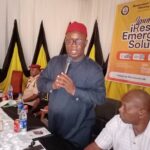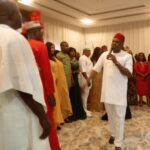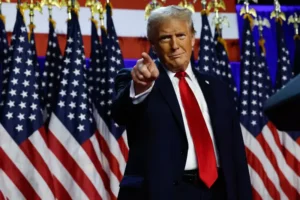WASHINGTON (AP) — Voters in the U.S. presidential election faced a public health crisis and a wounded economy, but neither candidate emerged as the clear choice to handle both of those issues, according to AP Votecast.
More voters — both nationwide and in key battlegrounds — said former Vice President Joe Biden would be better able to handle the coronavirus pandemic, the top concern for about 4 in 10 voters. But President Donald Trump edged out Biden on the question of who would be better to rebuild an economy besieged by nearly 11 million job losses and small businesses staring down a bleak winter. About 3 in 10 voters nationally ranked the economy as the most pressing issue.
The question of whether the pandemic or the economy mattered more to voters was a heated debate in the campaign. Trump argued that the economy should not be a casualty of the disease and maintained, without evidence, that the nation was “rounding the turn.” Biden has warned that the economy can never fully heal unless the coronavirus is first contained and businesses can fully reopen.
A majority of voters were receptive to that argument. About 6 in 10 voters said the government’s higher priority should be limiting the spread of the coronavirus, even if it damages the economy.
Despite the months of debate, three-quarters of all voters said they knew all along who they supported. And Trump weighed heavily on their minds — two-thirds said their decision was driven by their opinion of the untraditional president, either for or against.
Trump voters overwhelmingly endorsed their president. About 8 in 10 said their vote was in support of him, not in opposition to Biden. Meanwhile, Biden voters were closely split over whether they mainly supported Biden or opposed Trump with their vote for president.
Millions of voters rushed to cast their ballots early, and did so with a clear sense of anxiety and worry. About 6 in 10 voters — including most Biden voters and about a quarter of Trump voters — said they think things in the country are on the wrong track.
Trump’s campaign tried to make the handling of the economy a top selling point for his reelection, an uphill battle as unemployment spiked to double digits this spring. A comeback has recently showed signs of stalling as federal aid lapsed because the Trump administration and House Democrats could not reach a compromise. Only about 4 in 10 voters said the economy was good or excellent, with the rest describing conditions as not so good or poor.
Still, Trump’s image as a boon to business was resilient, despite the pandemic downturn.
Trump continued to draw support from a coalition of white men, white voters without a college degree and those living in small towns and rural communities. Biden enjoyed more backing from women, college graduates and Black, Hispanic and Asian voters.
The coronavirus outbreak has claimed more than 230,000 American lives and has been surging across the country in recent weeks. Still, voters were divided on whether the nation has contained the spread of the virus. About half of voters said the virus is at least somewhat under control, while roughly half described the coronavirus as out of control.
Voters in key battleground states shared anxieties about the virus and its spread. In Wisconsin, which saw an October spike in cases, close to half of voters said the pandemic was the top issue facing the country and about 6 in 10 said it was not under control. About two-thirds said the government should prioritize stopping its spread even if it means economic pain.
About half of Wisconsin voters said that Biden would do a superior job of combating the virus, roughly the same as in Michigan, North Carolina, Ohio and Pennsylvania. Trump had an edge in stewarding the economy, with roughly half of voters in these states saying he would do better than Biden.
More than 100 million Americans rushed to vote early and by mail, taking advantage of new rules intended to make voting safer and easier during the pandemic. Trump has sought to sow doubt about the new voting systems and the legitimacy of the count, and claimed without evidence that some voters would cheat. The survey found about 3 in 10 expressing doubts that their votes would be accurately counted.
Concerns about voting were somewhat higher in Pennsylvania, another key state in the election, compared with other states: 36% were not confident the vote count would be accurate.
Tensions over structural racism increased this summer after the police killings of several Black Americans, setting off peaceful protests and in some cases riots, looting and violence. Trump positioned himself as a defender of police and cast the protesters as radicals — part of an appeal to suburban and older voters who he thought would embrace a law and order message.
Nationally, about three-quarters of voters called racism a serious challenge for society as a whole and for policing in particular. About a quarter said they want to see the police be tougher on crime; about a third think police are too tough.
Notably, majorities of voters in two battleground states — Wisconsin and Minnesota — disapproved of protests over policing. Both states saw violence and destruction during demonstrations after police shootings of Black men.
SOURCE: APNEWS
December 22, 2024











Add Comment